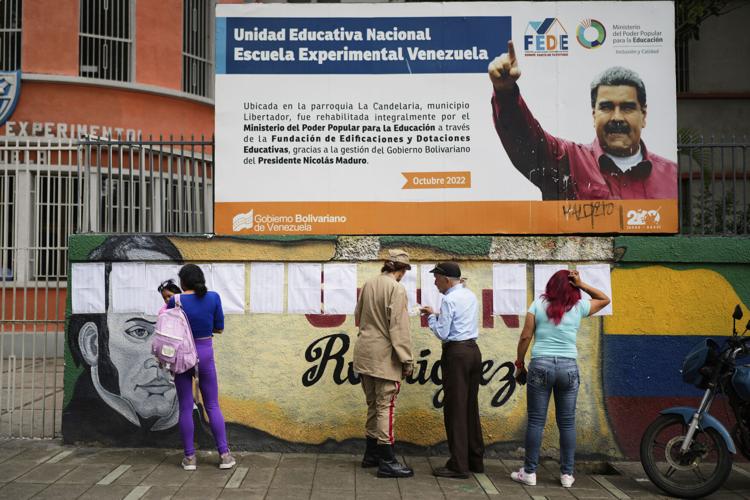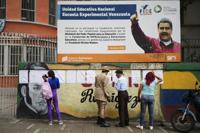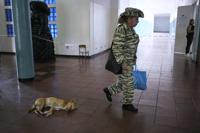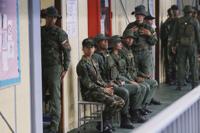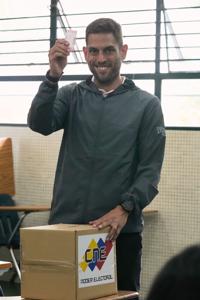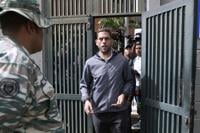CARACAS, Venezuela (AP) — Voters in Venezuela are choosing lawmakers, governors and other officials Sunday in polling being held against a backdrop of heightened government repression and opposition calls to boycott the election.
The election is the first to allow broad voter participation since last year’s presidential contest, which President Nicolás Maduro claimed to have won despite credible evidence to the contrary. It is taking place two days after the government detained dozens of people, including a prominent opposition leader, and linked them to an alleged plot to hinder the vote.
In the first hours after polls opened, members of the military outnumbered voters in some voting centers in the capital, Caracas. No lines formed outside the centers, including the country’s largest — a stark contrast with the hundreds of people gathered around the same time for the July 28 presidential election.
“I’m not going to vote," said truck driver Carlos León, 41, standing near a desolate polling station in Caracas. "I don’t believe in the (electoral authority). I don’t think they’ll respect the vote. Nobody forgets what happened in the presidential elections. It’s sad, but it’s true.”
Voter participation, in the eyes of the opposition, legitimizes Maduro’s claim to power and his government’s repressive apparatus, which after the July presidential election detained more than 2,000 people including protesters, poll workers, political activists and minors, to quash dissent. Meanwhile, the ruling party is already touting overwhelming victory across the country, just as it has done in previous regional elections regardless of opposition participation.
A nationwide poll conducted between April 29 and May 4 by the Venezuela-based research firm Delphos showed that only 15.9% of voters expressed a high probability of voting Sunday. Of those, 74.2% said they would vote for the candidates of the ruling United Socialist Party of Venezuela and its allies, while 13.8% said they would vote for contenders associated with two opposition leaders who are not boycotting the elections.
“I think it’s absolutely despicable,” opposition operative Humberto Villalobos said Saturday, referring to the election participation of some opposition members. “We’re facing the most brutal repression in recent years in the country. (The vote) is a comedy, a parody.”
Villalobos was elections division chief for opposition leader Maria Corina Machado when he and five other government opponents sought refuge in March 2024 at a diplomatic compound in Venezuela’s capital to avoid arrest. He spent more than a year there and on Saturday, along with four of the others, spoke publicly for the first time since they left the compound and arrived in the United States earlier this month.
U.S. Secretary of State Marco Rubio, who met with the group Friday, has described their departure from the compound as an international rescue operation. That assertion has been challenged by Venezuelan Interior Minister Diosdado Cabello, who has said it was the result of a negotiation with the government.
The ruling party-loyal National Electoral Council is overseeing Sunday’s election for state legislators, 285 members of the unicameral National Assembly and all 24 governors, including the newly created governorship purportedly established to administer Essequibo, a region long under dispute between Venezuela and neighboring Guyana.
Maduro maintains tight grip on government
In Maduro’s Venezuela, Sunday’s results will have little impact on people’s lives because his highly centralized government controls practically everything from Caracas. The government also represses the opposition by, for instance, disqualifying a candidate after the election or appointing a ruling-party loyalist to oversee the elected offices held by opponents, rendering them powerless.
Further, after the opposition won control of the National Assembly in 2015, Maduro created an election for members of a Constituent Assembly in 2017. That body, controlled by the ruling party, decreed itself superior to all other branches of government until it ceased to exist in 2020.
The ruling party controls 19 governorships and more than 90% of the National Assembly seats.
Some of Maduro’s allies justified Sunday's apparent low turnout with the speed of the electronic voting machines.
“We won’t see long lines because the process is very fast,” Freddy Bernal, who is seeking reelection as governor of the state of Táchira, told state television.
Meanwhile, voters trickled in to polling places in an opposition stronghold in Caracas. Some ignored the boycott calls based on the belief in their civic duty while others saw the election as a chance to keep their local government under opposition control.
“I'm defending my municipality,” said Edith, the owner of a bankrupt family business who declined to give her last name out of fear of government repression. “I'm still angry with what happened in July, but I have to defend it.”
Other voters cast ballots out of fear of losing their government jobs or food and other state-controlled benefits.
“Most of my friends aren’t going to vote, not even a blank vote,” state employee Miguel Otero, 69, said. “But we must comply. We have to send the photo (saying), ‘I’m here at the polling station now.’”

